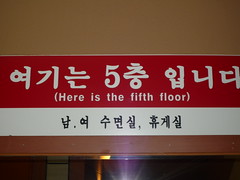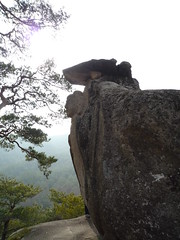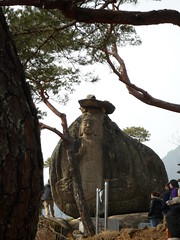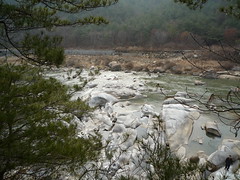Temple stay
Jeff, Maddy, Bo, and I went up to Seoul Friday the 13th on the KTX. The KTX provided fond memories of the trains in Germany and France, reaching speeds of 300km/hr. Once we arrived we stayed at a spa. The spas here have saunas, hot and cool pools, and other pools supplemented with interesting things like mugwort and yellow (sulfurous) sand. The spas are separated by sex and we all walk around in the nude. In the area open to both sexes there are restaurants, arcades, and then there are segregated sleeping areas, which were rows of 6'x3'x3' cubbies with mattresses and pillows (of sorts). Also, they apparently have a harem: The signage at the spa was generally fantastic:
The signage at the spa was generally fantastic:

In the morning I took a dip in the cold pool before we navigated our way through the subway system to where we met the bus for our trip. I hadn't seen so many Westerners in months, so it was weird being able to eavesdrop on conversations and realizing that my conversations would also be understood. It's amazing how quickly I got used to being a linguistic minority. I met some interesting people on the three hour ride and had some good conversations.
We were early for the temple, so we stopped for a short walk up to a Buddhist statue and a view of a beautiful river.

 I would have liked to have spent more time at the river, but faux monkhood beckoned. I was initially let down at the temple complex. They had a big plastic banner welcoming tourists and we were ushered into a brand new building that was jarringly modern, with a sound system, projector screen, etc. We were issued monks' robes, nametags, and locker keys and then separated by sex (which was by now a theme. I was mildly amused by Jeff and Maddy electing to spend Valentine's Day essentially apart, but I guess we weren't separated all that often). We were introduced to the program and our interpretor, and then we watched a painfully bad movie about the temple grounds. It basically just showed what we would be seeing ourselves in the next few hours, with Korean being spoken but without any subtitles or other translation. The editing was the worst part; one memorable shot was a slow motion pan of tourists walking across the area that we had just walked to get from the bus to where we were sitting, and it closed in on a woman stopping to tie her shoe. At this point I was afraid that the whole trip would be a commercialized Disneyland-esque imitation of Buddhist culture. However, things definitely picked up after the video. A monk showed us how to properly perform prostrations, which would be vital later. Then we went for a walking meditation, which essentially consists of walking very very slowly while only thinking of each footstep,
I would have liked to have spent more time at the river, but faux monkhood beckoned. I was initially let down at the temple complex. They had a big plastic banner welcoming tourists and we were ushered into a brand new building that was jarringly modern, with a sound system, projector screen, etc. We were issued monks' robes, nametags, and locker keys and then separated by sex (which was by now a theme. I was mildly amused by Jeff and Maddy electing to spend Valentine's Day essentially apart, but I guess we weren't separated all that often). We were introduced to the program and our interpretor, and then we watched a painfully bad movie about the temple grounds. It basically just showed what we would be seeing ourselves in the next few hours, with Korean being spoken but without any subtitles or other translation. The editing was the worst part; one memorable shot was a slow motion pan of tourists walking across the area that we had just walked to get from the bus to where we were sitting, and it closed in on a woman stopping to tie her shoe. At this point I was afraid that the whole trip would be a commercialized Disneyland-esque imitation of Buddhist culture. However, things definitely picked up after the video. A monk showed us how to properly perform prostrations, which would be vital later. Then we went for a walking meditation, which essentially consists of walking very very slowly while only thinking of each footstep, as opposed to our usual way of walking hurriedly and thinking frantically about what we have to do and where we are going instead of where we are and what we are doing right now. The walk ended in a field with a beautiful view of Lion Mountain, where the temple complex sits and where supposedly some of Buddha's ashes are hidden. The main shrine of the temple is dedicated to that relic, but doesn't actually house it because it might get stolen.
as opposed to our usual way of walking hurriedly and thinking frantically about what we have to do and where we are going instead of where we are and what we are doing right now. The walk ended in a field with a beautiful view of Lion Mountain, where the temple complex sits and where supposedly some of Buddha's ashes are hidden. The main shrine of the temple is dedicated to that relic, but doesn't actually house it because it might get stolen.
 After the walk we had a short break before dinner, during which I met a dog named Temple Dog. Those who most notice the cute animals from my posts will be glad that someone else thought to take a picture of it, which I have stolen for your viewing pleasure. For dinner we took part in a formal monastic meal ceremony. Buddhist monks should be very conscious and appreciative of the food they eat, and this ceremony ensures that consciousness. First we watched a video on how the process works, and I don't want to imagine how many more mistakes we would have made if our instructions had only been verbal. We then were handed four bowls, each slightly larger than the last so that they fit inside each other perfectly, along with a placemat, cleaning cloth, and chopsticks and spoon in a cloth container. We ritualistically unstacked our bowls into the correct places on placemats. We were then given water to wash the bowls, from biggest to smallest before being served. There was a rice bowl, a soup bowl, a side dish bowl, and a cleaning water bowl. We were permitted to take as much or as little as we wanted, unlike real monks. I went light on the side dishes knowing that sometime Korean side dishes taste appallingly bad and that we had to eat everything we took. We ate in silence and then used a last bit of pickled radish or kimchi along with some fresh water to clean our bowls. Then we ate the radish or kimchi and drank down the dregs, so that absolutely no speck of food matter is wasted. The original washing water is then used again to clean the bowls before being put back in a jug that is inspected by the head monk. If there is any food mater then all the monks must drink it. I think they took pity on us, but I also think we did a moderately good job. The water is given to a mountain spirit/demon that is the size of a mountain but that has a neck so narrow that even a tiny speck of food could choke it (I assume this explanation is given to initiates or children and then later they are taught that the reason is to appreciate food and not waste it).
After the walk we had a short break before dinner, during which I met a dog named Temple Dog. Those who most notice the cute animals from my posts will be glad that someone else thought to take a picture of it, which I have stolen for your viewing pleasure. For dinner we took part in a formal monastic meal ceremony. Buddhist monks should be very conscious and appreciative of the food they eat, and this ceremony ensures that consciousness. First we watched a video on how the process works, and I don't want to imagine how many more mistakes we would have made if our instructions had only been verbal. We then were handed four bowls, each slightly larger than the last so that they fit inside each other perfectly, along with a placemat, cleaning cloth, and chopsticks and spoon in a cloth container. We ritualistically unstacked our bowls into the correct places on placemats. We were then given water to wash the bowls, from biggest to smallest before being served. There was a rice bowl, a soup bowl, a side dish bowl, and a cleaning water bowl. We were permitted to take as much or as little as we wanted, unlike real monks. I went light on the side dishes knowing that sometime Korean side dishes taste appallingly bad and that we had to eat everything we took. We ate in silence and then used a last bit of pickled radish or kimchi along with some fresh water to clean our bowls. Then we ate the radish or kimchi and drank down the dregs, so that absolutely no speck of food matter is wasted. The original washing water is then used again to clean the bowls before being put back in a jug that is inspected by the head monk. If there is any food mater then all the monks must drink it. I think they took pity on us, but I also think we did a moderately good job. The water is given to a mountain spirit/demon that is the size of a mountain but that has a neck so narrow that even a tiny speck of food could choke it (I assume this explanation is given to initiates or children and then later they are taught that the reason is to appreciate food and not waste it).







 We awoke at 4am for the morning service. Our five hours of rest is worlds of sleep according to monks. In order to be a monk one must spend six years as an apprentice monk, and they only get three and a half hours of sleep a night every night of those six years. The morning service was part way up the mountain in a shrine decorated with lotuses. The service consisted of us chanting in Korean. Then they had us groggily perform sitting meditation for twenty minutes. The monk liaison told us about how they hit monks that fall asleep during meditation with bamboo rods and even demonstrated on the one of us who had done meditation for years, but they didn't hit anyone once the meditation began. I was actually able to meditate for the first time in my life. Whenever I have tried to do so in the past I have been unable to shut off the frantic stream of thoughts that is my world, but my mind has slowed down the last couple years. On one hand that makes feel dumber than I once was, but on the other hand I can meditate and I don't have insomnia anymore. I'm not sure which I prefer. Anyway, while meditating I just counted my breaths (in Korean) and managed to not think about anything but that and what I was feeling in the moment. I have gotten a lot better at the whole Mindfulness thing, where you pay attention to what you are experiencing in the present instead of living in the hypothetical and theoretical (my usual stomping grounds).
We awoke at 4am for the morning service. Our five hours of rest is worlds of sleep according to monks. In order to be a monk one must spend six years as an apprentice monk, and they only get three and a half hours of sleep a night every night of those six years. The morning service was part way up the mountain in a shrine decorated with lotuses. The service consisted of us chanting in Korean. Then they had us groggily perform sitting meditation for twenty minutes. The monk liaison told us about how they hit monks that fall asleep during meditation with bamboo rods and even demonstrated on the one of us who had done meditation for years, but they didn't hit anyone once the meditation began. I was actually able to meditate for the first time in my life. Whenever I have tried to do so in the past I have been unable to shut off the frantic stream of thoughts that is my world, but my mind has slowed down the last couple years. On one hand that makes feel dumber than I once was, but on the other hand I can meditate and I don't have insomnia anymore. I'm not sure which I prefer. Anyway, while meditating I just counted my breaths (in Korean) and managed to not think about anything but that and what I was feeling in the moment. I have gotten a lot better at the whole Mindfulness thing, where you pay attention to what you are experiencing in the present instead of living in the hypothetical and theoretical (my usual stomping grounds).

 [((6*3)+(6*3))*3=108]. I happen to disagree on this point and believe that one can enjoy things without being so attached to those things that one has to suffer when those things inevitably disappear. However, several people find
[((6*3)+(6*3))*3=108]. I happen to disagree on this point and believe that one can enjoy things without being so attached to those things that one has to suffer when those things inevitably disappear. However, several people find my ability to sever attachments frightening and a bit inhuman, so perhaps it is not ideal (If it lets me be happy regardless of my conditions, though, I don't care who I scare). After we made our prayer beads we hung up our prayer pouches alongside those of everyone who has visited the temple for the last year. After that we just ate lunch, packed up, and took the three hour bus-ride back to Seoul.
my ability to sever attachments frightening and a bit inhuman, so perhaps it is not ideal (If it lets me be happy regardless of my conditions, though, I don't care who I scare). After we made our prayer beads we hung up our prayer pouches alongside those of everyone who has visited the temple for the last year. After that we just ate lunch, packed up, and took the three hour bus-ride back to Seoul.

(Photo credits: all pictures not on my flicker account were taken by Charlotte White)
0 comments:
Post a Comment